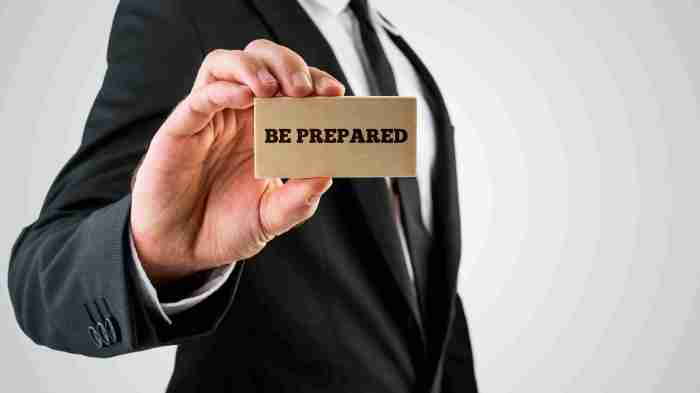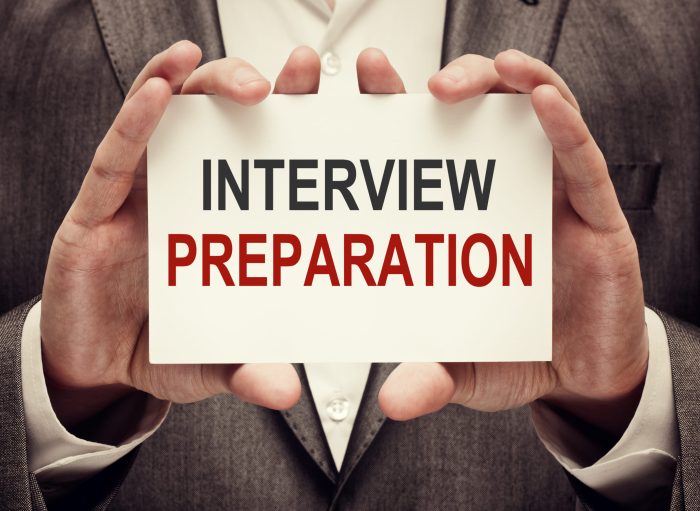Job Interview Preparation: Ace Your Interview with Confidence sets the stage for success, offering a sneak peek into the world of preparing for that crucial job interview. Get ready to dive into the strategies and tips that will help you land your dream job!
Importance of Job Interview Preparation

Proper preparation before a job interview is crucial for putting your best foot forward and increasing your chances of landing the job. It allows you to showcase your skills, knowledge, and experience effectively, demonstrating to the interviewer that you are the right fit for the position.
Positive Impact of Good Preparation
- Confidence Boost: Thorough preparation helps boost your confidence, enabling you to speak articulately and assertively during the interview.
- Showcasing Skills: By preparing answers to common interview questions and practicing responses, you can effectively highlight your skills and qualifications.
- Research Advantage: Researching the company and the role beforehand shows your genuine interest and helps you tailor your responses to align with the organization’s values and goals.
Tips for Effective Job Interview Preparation
- Study the Job Description: Understand the requirements of the job and how your skills and experiences align with them.
- Practice Common Questions: Practice responses to common interview questions to articulate your experiences and accomplishments effectively.
- Dress Appropriately: Choose professional attire that aligns with the company’s dress code to make a positive first impression.
- Prepare Questions: Have thoughtful questions prepared to ask the interviewer, showing your interest in the role and the company.
Consequences of Inadequate Preparation
- Missed Opportunities: Inadequate preparation can lead to missed opportunities to showcase your qualifications and skills effectively.
- Lack of Confidence: Without proper preparation, you may feel less confident during the interview, impacting your ability to communicate your strengths.
- Poor Impression: Lack of research about the company or role can give the impression that you are not genuinely interested, affecting your chances of getting hired.
Researching the Company
Researching the company before a job interview is crucial for showing the employer that you are genuinely interested in the position. It also helps you understand the company’s values, goals, and culture, allowing you to tailor your responses to align with what they are looking for in a candidate.
Significance of Researching the Company
- Gain a better understanding of the company’s products or services.
- Learn about the company’s mission, vision, and values.
- Identify recent news or developments related to the company.
Benefits during the Interview
- Impress the interviewer by demonstrating your knowledge about the company.
- Answer questions more effectively by referencing specific information about the company.
- Show that you are a good fit for the company culture and values.
Steps for Conducting Research
- Visit the company’s official website and read about their history, products, and any recent news.
- Check the company’s social media profiles for updates, events, and employee testimonials.
- Read reviews from current and former employees on websites like Glassdoor to get insights into the company culture.
- Explore the LinkedIn profiles of key employees to understand their backgrounds and roles within the company.
Understanding Company Culture and Values
- Researching the company’s culture helps you determine if you would be a good fit within the organization.
- Understanding the company’s values allows you to align your responses during the interview with what matters most to the company.
- Showing that you resonate with the company’s culture and values can set you apart from other candidates.
Common Interview Questions
When preparing for a job interview, it’s important to anticipate common questions that may be asked by the interviewer. Being able to effectively answer these questions can help you showcase your skills and experiences confidently.
Behavioral and Situational Questions
- Explain a situation where you had to work under pressure and how you handled it.
- Describe a time when you had to resolve a conflict within a team.
- Share an example of a successful project you completed and the role you played in it.
Strategies for Answering Behavioral and Situational Questions
- Use the STAR method (Situation, Task, Action, Result) to structure your responses.
- Focus on specific examples from your past work or academic experiences.
- Highlight your problem-solving skills and ability to work well in a team.
Tailoring Responses to Showcase Skills
- Research the job requirements and company culture to align your responses accordingly.
- Emphasize relevant skills and experiences that match the job description.
- Showcase your achievements and how they demonstrate your qualifications for the position.
Handling Unexpected or Challenging Questions
- Stay calm and composed, take a moment to gather your thoughts before responding.
- Be honest and transparent, even if you don’t have a perfect answer.
- Redirect the conversation to focus on your strengths and positive attributes.
Dressing and Body Language
When it comes to job interviews, dressing and body language play a crucial role in making a positive impression on the interviewer. Your attire and non-verbal cues can speak volumes about your professionalism and confidence, so it’s essential to pay attention to these aspects.
Importance of Dressing Appropriately
First impressions matter, and your outfit is often the first thing the interviewer will notice about you. Dressing appropriately shows that you take the interview seriously and respect the company’s culture. It also demonstrates your attention to detail and ability to present yourself in a professional manner.
Influence of Body Language
Body language can convey confidence, enthusiasm, and interest in the position. Maintaining good eye contact, sitting up straight, and offering a firm handshake can leave a positive impression on the interviewer. Conversely, slouching, fidgeting, or avoiding eye contact may indicate nervousness or lack of confidence.
Guidelines on Professional Attire
- Dress in clean, well-fitted clothing that is appropriate for the company’s dress code.
- Avoid loud colors, flashy accessories, or overly casual attire.
- Opt for classic business attire such as a suit, blouse, and dress shoes.
- Ensure your outfit is ironed and free of wrinkles or stains.
Tips for Positive Body Language
- Smile and greet the interviewer with a firm handshake.
- Maintain good posture and sit up straight throughout the interview.
- Make eye contact to show engagement and interest in the conversation.
- Avoid crossing your arms, fidgeting, or playing with your hair as these can convey nervousness.
- Listen actively and nod to show understanding and agreement with the interviewer.
Mock Interviews and Practice

Participating in mock interviews can be extremely beneficial for job seekers. It provides an opportunity to practice answering common interview questions, improve communication skills, and boost confidence before the actual interview. Here’s some guidance on how to organize and conduct effective mock interviews:
Organizing Mock Interviews
- Choose a quiet and professional setting for the mock interview.
- Select a friend, family member, or mentor to act as the interviewer.
- Prepare a list of common interview questions to simulate a real interview scenario.
- Set a time limit for each question and for the overall interview to keep it efficient.
Practicing Common Interview Scenarios, Job Interview Preparation
- Practice answering questions about your experience, strengths, weaknesses, and why you are the best fit for the job.
- Work on articulating your responses clearly and concisely.
- Practice maintaining good eye contact, posture, and positive body language throughout the interview.
Seeking Feedback for Improvement
- After the mock interview, ask for feedback on your responses, communication style, and overall performance.
- Take note of areas where you can improve and work on them before the actual interview.
- Use the feedback to refine your answers, boost your confidence, and ensure you are well-prepared.